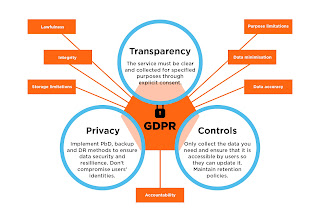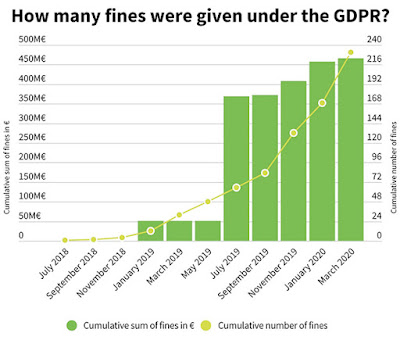Yes, the General Data Protection Regulation (GDPR) is actively enforced. Since its implementation on May 25, 2018, the GDPR has had a significant impact on data protection and privacy practices globally. The regulation applies to organizations that handle the personal data of individuals within the European Union (EU) and aims to strengthen the protection of individual's personal data and provide them with greater control over how their data is collected, used, and stored.
Under the GDPR, supervisory authorities in each EU member state are responsible for enforcing the regulation and ensuring compliance. These authorities have the power to investigate organizations, impose fines, and take corrective measures when they find violations of the GDPR's requirements.
There have been several high-profile cases of GDPR enforcement since its introduction. Supervisory authorities have issued fines to various organizations for non-compliance with the regulation. For example, in 2019, Google was fined €50 million by the French data protection authority (CNIL) for lack of transparency and inadequate consent mechanisms.
It's important to note that the enforcement of the GDPR is an ongoing process, and the level of enforcement and fines can vary across different cases and jurisdictions. Nonetheless, the GDPR has had a significant impact on the data protection landscape, encouraging organizations to take data privacy more seriously and providing individuals with increased rights and control over their personal data.
Who Enforces the GDPR?
The General Data Protection Regulation (GDPR) is enforced by supervisory authorities in each European Union (EU) member state. Each member state has its own independent data protection authority (DPA) responsible for enforcing and overseeing compliance with the GDPR within its jurisdiction. These DPAs act as regulatory bodies for data protection matters and have powers to investigate, impose fines, and take corrective actions.
The DPAs play a crucial role in enforcing the GDPR and ensuring organizations comply with the regulation's requirements. They have the authority to:
- Investigate Complaints: DPAs investigate complaints lodged by individuals regarding potential GDPR violations, such as improper handling of personal data, data breaches, or violations of individuals' rights.
- Conduct Audits and Inspections: DPAs have the power to perform audits and inspections of organizations to assess their compliance with the GDPR. These audits can be proactive or initiated in response to specific concerns or complaints.
- Impose Fines and Sanctions: If a DPA finds that an organization has violated the GDPR, it has the authority to impose fines and other sanctions. The fines can be substantial, as discussed in a previous response.
- Provide Guidance and Advice: DPAs offer guidance and advice to organizations and individuals on how to comply with the GDPR and address data protection concerns. They also publish guidelines and interpretative documents to clarify the GDPR's requirements.
- Cooperate with Other DPAs: DPAs collaborate and cooperate with each other on cross-border cases or matters that involve multiple jurisdictions. This ensures consistent enforcement and harmonization of data protection practices across the EU.
It's important to note that the European Data Protection Board (EDPB) also plays a role in the enforcement of the GDPR. The EDPB consists of representatives from each DPA and provides guidance, consistency, and cooperation among the DPAs to ensure the effective application of the GDPR throughout the EU.
Here are some examples of GDPR being enforced:
There have been several notable examples of the General Data Protection Regulation (GDPR) being enforced since its implementation. Here are a few examples:
- Google (France, 2019): The French data protection authority (CNIL) fined Google €50 million for lack of transparency and inadequate consent mechanisms in relation to personalized advertisements.
- British Airways (UK, 2019): The UK Information Commissioner's Office (ICO) issued a notice of intent to fine British Airways £183.4 million for a data breach that affected approximately 500,000 customers. The final fine was reduced to £20 million in 2020 due to mitigating factors.
- Marriott International (UK, 2019): The ICO announced its intention to fine Marriott International £99 million for a data breach that exposed personal data of around 339 million guests globally. The final fine was reduced to £18.4 million in 2020.
- H&M (Germany, 2020): The Hamburg Commissioner for Data Protection and Freedom of Information imposed a fine of €35.3 million on H&M for unlawfully processing employees' personal data, including intrusive surveillance of their private lives.
- Amazon (Luxembourg, 2021): The Luxembourg National Data Protection Commission fined Amazon €746 million for alleged violations of the GDPR related to the processing of personal data for targeted advertising purposes.
- WhatsApp (Ireland, 2021): The Irish Data Protection Commission imposed a fine of €225 million on WhatsApp for failure to meet GDPR transparency requirements regarding the sharing of user data with other Facebook-owned companies.
These are just a few examples, and there have been numerous other cases of GDPR enforcement across different industries and countries. The fines imposed can vary depending on the severity of the violation, the size of the organization, and other relevant factors. The enforcement of GDPR continues to evolve as supervisory authorities investigate and address non-compliance with the regulation.
How much are GDPR fines?
Under the General Data Protection Regulation (GDPR), supervisory authorities in each EU member state have the power to impose fines for non-compliance with the regulation. The fines can be substantial and are designed to be a deterrent against violations of individuals' data protection rights. The GDPR distinguishes between two types of fines:
- Administrative fines: These fines can be imposed for a wide range of violations of the GDPR provisions. The maximum amount for administrative fines depends on the specific infringement category:
- a. For less severe infringements, such as not maintaining records or not conducting data protection impact assessments, the maximum fine can be up to €10 million or 2% of the global annual turnover of the preceding financial year, whichever is higher.
- b. For more serious infringements, such as violating the core principles of data processing, failing to obtain valid consent, or not complying with individuals' rights, the maximum fine can be up to €20 million or 4% of the global annual turnover of the preceding financial year, whichever is higher.
- Compensation for individuals: In addition to administrative fines, individuals who have suffered material or non-material damage as a result of a GDPR violation have the right to receive compensation from the data controller or processor responsible.
It's important to note that the actual fines imposed can vary depending on the circumstances of each case. Supervisory authorities assess factors such as the nature, gravity, and duration of the infringement, the level of cooperation from the organization, and any previous infringements when determining the final amount of the fine.
The GDPR provides supervisory authorities with a range of enforcement measures, including warnings, reprimands, audits, and orders to cease processing data. Fines are intended to be proportionate and dissuasive, ensuring organizations take data protection and privacy seriously.
Fines over the last few years.




